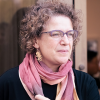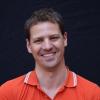Webinars by year
 Registration |
Emily M. Bender (University of Washington) Summary: Humans make sense of language in context, bringing to bear their own understanding of the world including their model of their interlocutor's understanding of the world. In this talk, I will explore various potential risks that arise when we as humans bring this sense-making capacity to interactions with artificial interlocutors. That is, I will ask what happens in conversations where one party has no (or extremely limited) access to meaning and all of the interpretative work rests with the other, and briefly explore what this entails for the design of language technology. Bio: Emily M. Bender is a Professor of Linguistics and an Adjunct Professor in the School of Computer Science and the Information School at the University of Washington, where she has been on the faculty since 2003. Her research interests include multilingual grammar engineering, computational semantics, and the societal impacts of language technology. In 2022 she was elected as a Fellow of the American Association for the Advancement of Science (AAAS). .... |
 |
Pascale Fung (The Hong Kong University of Science and Technology) Summary: Generative models for Conversational AI are less than a decade old, but they hold great promise for human-machine interactions. Machine responses based on generative models can seem quite fluent and human-like, empathetic and funny, knowledgeable and professional. However, behind the confident voice of generative ConvAI systems, they can also be hallucinating misinformation, giving biased and harmful views, and are still not "safe" enough for many real life applications. The expressive power of generative ConvAI models and their undesirable behavior are two sides of the same coin. How can we harness the fluency, diversity, engagingness of generative ConvAI models while mitigating the downside? In this talk, I will present some of our team’s recent work in making generative ConvAI safer via mitigating hallucinations, misinformation, and toxicity. Bio: Pascale Fung is a Chair Professor at the Department of Electronic & Computer Engineering at The Hong Kong University of Science & Technology (HKUST), and a visiting professor at the Central Academy of Fine Arts in Beijing. She is an elected Fellow of the Association for the Advancement of Artificial Intelligence (AAAI) for her "significant contributions to the field of conversational AI and to the development of ethical AI principles and algorithms", an elected Fellow of the Association for Computational Linguistics (ACL) for her “significant contributions towards statistical NLP, comparable corpora, and building intelligent systems that can understand and empathize with humans”. She is a Fellow of the Institute of Electrical and Electronic Engineers (IEEE) for her “contributions to human-machine interactions” and an elected Fellow of the International Speech Communication Association for “fundamental contributions to the interdisciplinary area of spoken language human-machine interactions”. She is the Director of HKUST Centre for AI Research (CAiRE). She was the founding chair of the Women Faculty Association at HKUST. She is an expert on the Global Future Council, a think tank for the World Economic Forum. She represents HKUST on Partnership on AI to Benefit People and Society. She is on the Board of Governors of the IEEE Signal Processing Society. She is a member of the IEEE Working Group to develop an IEEE standard - Recommended Practice for Organizational Governance of Artificial Intelligence. Her research team has won several best and outstanding paper awards at ACL, ACL and NeurIPS workshops. .... |
 |
Martin Cooke (Ikerbasque – Basque Foundation for Science) Summary: No theory of speech perception can be considered complete without an explanation of how listeners are able to extract meaning from severely degraded forms of speech. Starting with a brief overview of a century of research which has seen the development of many types of distorted speech, followed by some anecdotal evidence that automatic speech recognisers still have some way to go to match listeners' performance in this area, I will describe the outcome of one recent [1] and several ongoing studies into the detailed time course of a listener's response to distorted speech. These studies variously consider the rapidity of adaptation, whether adaptation can only proceed if words are recognised, the degree to which the response to one form of distortion is conditioned on prior experience with other forms, and the nature of adaptation in a language other than one's own native tongue. Taken together, findings from these experiments suggest that listeners are capable of continuous and extremely rapid adaptation to novel forms of speech that differ greatly from the type of input that makes up the vast bulk of their listening experience. It is an open question as to whether big-data-based automatic speech recognition can offer a similar degree of flexibility. [1] Cooke, M, Scharenborg, O and Meyer, B (2022). The time course of adaptation to distorted speech. J. Acoust. Soc. Am. 151, 2636-2646. 10.1121/10.0010235 Bio: Martin Cooke is Ikerbasque Research Professor. After starting his career in the UK National Physical Laboratory, he worked at the University of Sheffield for 26 years before taking up his current position. His research has focused on analysing the computational auditory scene, devising algorithms for robust automatic speech recognition and investigating human speech perception. His interests also include the effects of noise on talkers as well as listeners, and second language listening in noise. .... |
 |
Isabelle Augenstein (University of Copenhagen) Summary: Most work on scholarly document processing assumes that the information processed is trustworthy and factually correct. However, this is not always the case. There are two core challenges, which should be addressed: 1) ensuring that scientific publications are credible -- e.g. that claims are not made without supporting evidence, and that all relevant supporting evidence is provided; and 2) that scientific findings are not misrepresented, distorted or outright misreported when communicated by journalists or the general public. In this talk, I will present some first steps towards addressing these problems, discussing our research on exaggeration detection, scientific fact checking, and on modelling information change in scientific communication more broadly. Bio: Isabelle Augenstein is a Professor at the University of Copenhagen, Department of Computer Science, where she heads the Copenhagen Natural Language Understanding research group as well as the Natural Language Processing section. Her main research interests are fact checking, low-resource learning, and explainability. Prior to starting a faculty position, she was a postdoctoral researcher at University College London, and before that a PhD student at the University of Sheffield. In October 2022, Isabelle Augenstein became Denmark’s youngest ever female full professor. She currently holds a prestigious ERC Starting Grant on 'Explainable and Robust Automatic Fact Checking', as well as the Danish equivalent of that, a DFF Sapere Aude Research Leader fellowship on 'Learning to Explain Attitudes on Social Media’. She is a member of the Young Royal Danish Academy of Sciences and Letters, and Vice President-Elect of SIGDAT, which organises the EMNLP conference series. .... |
 |
Thomas Hueber (CNRS/GIPSA-lab) Summary: Speech production is a complex motor process involving several physiological phenomena, such as the neural, nervous and muscular activities that drive our respiratory, laryngeal and articulatory movements. Modeling speech production, in particular the relationship between articulatory gestures (tongue, lips, jaw, velum) and acoustic realizations of speech, is a challenging, and still evolving, research question. From an applicative point of view, such models could be embedded into assistive devices able to restore oral communication when part of the speech production chain is damaged (articulatory synthesis, silent speech interface). They could also help rehabilitate speech sound disorders using a therapy based on biofeedback (and articulatory inversion). From a more fundamental research perspective, such models can also be used to question the cognitive mechanisms underlying speech learning, perception and motor control. In this talk, I will present three recent studies conducted in our group to address some of these fundamental questions. In the first one, we quantified the benefit of relying on lip movement when learning speech representations in a self-supervised manner using predictive coding techniques. In the second one, we integrated articulatory priors into the latent space of a variational auto-encoder, with potential application to speech enhancement. In the third one, I will describe a first attempt toward a computational model of speech learning, based on deep learning, which can be used to understand how a child learns the acoustic-to-articulatory inverse mapping in a self-supervised manner. Bio: Thomas Hueber is a senior research scientist at CNRS (« Directeur de recherche ») working at GIPSA-lab in Grenoble, France. He is head of the CRISSP research team (cognitive robotics, interactive systems and speech processing). He holds a Ph.D. in Computer Science from Pierre and Marie Curie University (Paris) in 2009. His research activities focus on automatic speech processing, with a particular interest in (1) the capture, analysis and modeling of articulatory gestures and electrophysiological signals involved in its production, (2) the development of speech technologies that exploit these different signals, for speech recognition and synthesis, for people with a spoken communication disorder, and (3) the study, through modeling and simulation, of the cognitive mechanisms underlying speech perception and production. He received in 2011 the 6th Christian Benoit award (ISCA/AFCP/ACB) and in 2015 the ISCA Award for the best paper published in Speech Communication. In 2017, he co-edited in IEEE/ACM Trans. Audio Speech and Language Processing, a special issue on Biosignal-based speech processing. He is also associate editor of EURASIP Journal on Audio, Speech, and Music Processing. .... |




